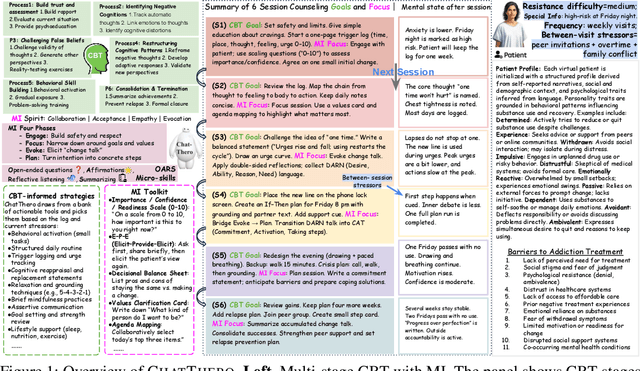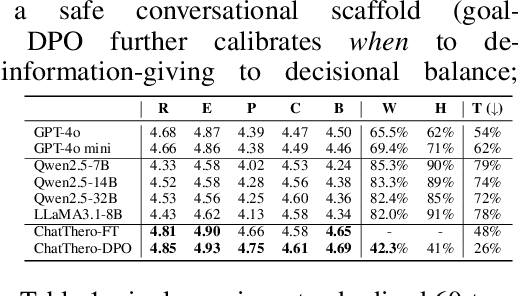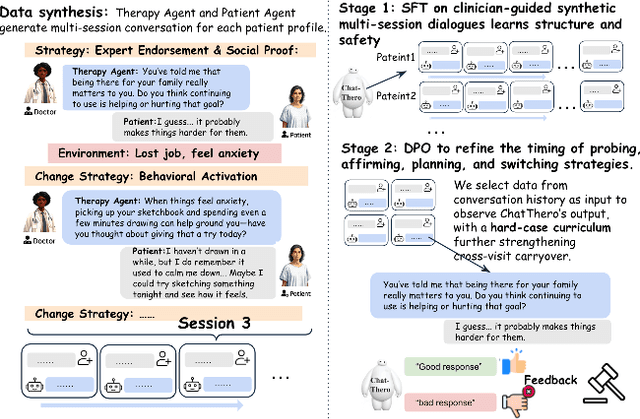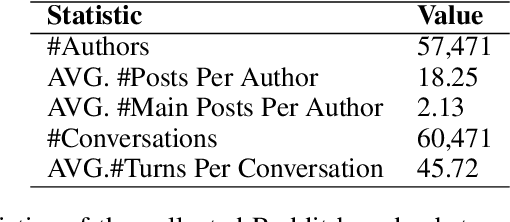Zonghai Yao
Knowing When to Abstain: Medical LLMs Under Clinical Uncertainty
Jan 18, 2026Abstract:Current evaluation of large language models (LLMs) overwhelmingly prioritizes accuracy; however, in real-world and safety-critical applications, the ability to abstain when uncertain is equally vital for trustworthy deployment. We introduce MedAbstain, a unified benchmark and evaluation protocol for abstention in medical multiple-choice question answering (MCQA) -- a discrete-choice setting that generalizes to agentic action selection -- integrating conformal prediction, adversarial question perturbations, and explicit abstention options. Our systematic evaluation of both open- and closed-source LLMs reveals that even state-of-the-art, high-accuracy models often fail to abstain with uncertain. Notably, providing explicit abstention options consistently increases model uncertainty and safer abstention, far more than input perturbations, while scaling model size or advanced prompting brings little improvement. These findings highlight the central role of abstention mechanisms for trustworthy LLM deployment and offer practical guidance for improving safety in high-stakes applications.
PRIME: Planning and Retrieval-Integrated Memory for Enhanced Reasoning
Sep 26, 2025Abstract:Inspired by the dual-process theory of human cognition from \textit{Thinking, Fast and Slow}, we introduce \textbf{PRIME} (Planning and Retrieval-Integrated Memory for Enhanced Reasoning), a multi-agent reasoning framework that dynamically integrates \textbf{System 1} (fast, intuitive thinking) and \textbf{System 2} (slow, deliberate thinking). PRIME first employs a Quick Thinking Agent (System 1) to generate a rapid answer; if uncertainty is detected, it then triggers a structured System 2 reasoning pipeline composed of specialized agents for \textit{planning}, \textit{hypothesis generation}, \textit{retrieval}, \textit{information integration}, and \textit{decision-making}. This multi-agent design faithfully mimics human cognitive processes and enhances both efficiency and accuracy. Experimental results with LLaMA 3 models demonstrate that PRIME enables open-source LLMs to perform competitively with state-of-the-art closed-source models like GPT-4 and GPT-4o on benchmarks requiring multi-hop and knowledge-grounded reasoning. This research establishes PRIME as a scalable solution for improving LLMs in domains requiring complex, knowledge-intensive reasoning.
DischargeSim: A Simulation Benchmark for Educational Doctor-Patient Communication at Discharge
Sep 10, 2025Abstract:Discharge communication is a critical yet underexplored component of patient care, where the goal shifts from diagnosis to education. While recent large language model (LLM) benchmarks emphasize in-visit diagnostic reasoning, they fail to evaluate models' ability to support patients after the visit. We introduce DischargeSim, a novel benchmark that evaluates LLMs on their ability to act as personalized discharge educators. DischargeSim simulates post-visit, multi-turn conversations between LLM-driven DoctorAgents and PatientAgents with diverse psychosocial profiles (e.g., health literacy, education, emotion). Interactions are structured across six clinically grounded discharge topics and assessed along three axes: (1) dialogue quality via automatic and LLM-as-judge evaluation, (2) personalized document generation including free-text summaries and structured AHRQ checklists, and (3) patient comprehension through a downstream multiple-choice exam. Experiments across 18 LLMs reveal significant gaps in discharge education capability, with performance varying widely across patient profiles. Notably, model size does not always yield better education outcomes, highlighting trade-offs in strategy use and content prioritization. DischargeSim offers a first step toward benchmarking LLMs in post-visit clinical education and promoting equitable, personalized patient support.
ChatThero: An LLM-Supported Chatbot for Behavior Change and Therapeutic Support in Addiction Recovery
Aug 28, 2025



Abstract:Substance use disorders (SUDs) affect over 36 million people worldwide, yet few receive effective care due to stigma, motivational barriers, and limited personalized support. Although large language models (LLMs) show promise for mental-health assistance, most systems lack tight integration with clinically validated strategies, reducing effectiveness in addiction recovery. We present ChatThero, a multi-agent conversational framework that couples dynamic patient modeling with context-sensitive therapeutic dialogue and adaptive persuasive strategies grounded in cognitive behavioral therapy (CBT) and motivational interviewing (MI). We build a high-fidelity synthetic benchmark spanning Easy, Medium, and Hard resistance levels, and train ChatThero with a two-stage pipeline comprising supervised fine-tuning (SFT) followed by direct preference optimization (DPO). In evaluation, ChatThero yields a 41.5\% average gain in patient motivation, a 0.49\% increase in treatment confidence, and resolves hard cases with 26\% fewer turns than GPT-4o, and both automated and human clinical assessments rate it higher in empathy, responsiveness, and behavioral realism. The framework supports rigorous, privacy-preserving study of therapeutic conversation and provides a robust, replicable basis for research and clinical translation.
SynthEHR-Eviction: Enhancing Eviction SDoH Detection with LLM-Augmented Synthetic EHR Data
Jul 10, 2025Abstract:Eviction is a significant yet understudied social determinants of health (SDoH), linked to housing instability, unemployment, and mental health. While eviction appears in unstructured electronic health records (EHRs), it is rarely coded in structured fields, limiting downstream applications. We introduce SynthEHR-Eviction, a scalable pipeline combining LLMs, human-in-the-loop annotation, and automated prompt optimization (APO) to extract eviction statuses from clinical notes. Using this pipeline, we created the largest public eviction-related SDoH dataset to date, comprising 14 fine-grained categories. Fine-tuned LLMs (e.g., Qwen2.5, LLaMA3) trained on SynthEHR-Eviction achieved Macro-F1 scores of 88.8% (eviction) and 90.3% (other SDoH) on human validated data, outperforming GPT-4o-APO (87.8%, 87.3%), GPT-4o-mini-APO (69.1%, 78.1%), and BioBERT (60.7%, 68.3%), while enabling cost-effective deployment across various model sizes. The pipeline reduces annotation effort by over 80%, accelerates dataset creation, enables scalable eviction detection, and generalizes to other information extraction tasks.
MedReadCtrl: Personalizing medical text generation with readability-controlled instruction learning
Jul 10, 2025Abstract:Generative AI has demonstrated strong potential in healthcare, from clinical decision support to patient-facing chatbots that improve outcomes. A critical challenge for deployment is effective human-AI communication, where content must be both personalized and understandable. We introduce MedReadCtrl, a readability-controlled instruction tuning framework that enables LLMs to adjust output complexity without compromising meaning. Evaluations of nine datasets and three tasks across medical and general domains show that MedReadCtrl achieves significantly lower readability instruction-following errors than GPT-4 (e.g., 1.39 vs. 1.59 on ReadMe, p<0.001) and delivers substantial gains on unseen clinical tasks (e.g., +14.7 ROUGE-L, +6.18 SARI on MTSamples). Experts consistently preferred MedReadCtrl (71.7% vs. 23.3%), especially at low literacy levels. These gains reflect MedReadCtrl's ability to restructure clinical content into accessible, readability-aligned language while preserving medical intent, offering a scalable solution to support patient education and expand equitable access to AI-enabled care.
Enhancing LLMs for Identifying and Prioritizing Important Medical Jargons from Electronic Health Record Notes Utilizing Data Augmentation
Feb 25, 2025Abstract:OpenNotes enables patients to access EHR notes, but medical jargon can hinder comprehension. To improve understanding, we evaluated closed- and open-source LLMs for extracting and prioritizing key medical terms using prompting, fine-tuning, and data augmentation. We assessed LLMs on 106 expert-annotated EHR notes, experimenting with (i) general vs. structured prompts, (ii) zero-shot vs. few-shot prompting, (iii) fine-tuning, and (iv) data augmentation. To enhance open-source models in low-resource settings, we used ChatGPT for data augmentation and applied ranking techniques. We incrementally increased the augmented dataset size (10 to 10,000) and conducted 5-fold cross-validation, reporting F1 score and Mean Reciprocal Rank (MRR). Our result show that fine-tuning and data augmentation improved performance over other strategies. GPT-4 Turbo achieved the highest F1 (0.433), while Mistral7B with data augmentation had the highest MRR (0.746). Open-source models, when fine-tuned or augmented, outperformed closed-source models. Notably, the best F1 and MRR scores did not always align. Few-shot prompting outperformed zero-shot in vanilla models, and structured prompts yielded different preferences across models. Fine-tuning improved zero-shot performance but sometimes degraded few-shot performance. Data augmentation performed comparably or better than other methods. Our evaluation highlights the effectiveness of prompting, fine-tuning, and data augmentation in improving model performance for medical jargon extraction in low-resource scenarios.
RARE: Retrieval-Augmented Reasoning Enhancement for Large Language Models
Dec 05, 2024Abstract:This work introduces RARE (Retrieval-Augmented Reasoning Enhancement), a versatile extension to the mutual reasoning framework (rStar), aimed at enhancing reasoning accuracy and factual integrity across large language models (LLMs) for complex, knowledge-intensive tasks such as commonsense and medical reasoning. RARE incorporates two innovative actions within the Monte Carlo Tree Search (MCTS) framework: A6, which generates search queries based on the initial problem statement, performs information retrieval using those queries, and augments reasoning with the retrieved data to formulate the final answer; and A7, which leverages information retrieval specifically for generated sub-questions and re-answers these sub-questions with the relevant contextual information. Additionally, a Retrieval-Augmented Factuality Scorer is proposed to replace the original discriminator, prioritizing reasoning paths that meet high standards of factuality. Experimental results with LLaMA 3.1 show that RARE enables open-source LLMs to achieve competitive performance with top open-source models like GPT-4 and GPT-4o. This research establishes RARE as a scalable solution for improving LLMs in domains where logical coherence and factual integrity are critical.
MCQG-SRefine: Multiple Choice Question Generation and Evaluation with Iterative Self-Critique, Correction, and Comparison Feedback
Oct 17, 2024



Abstract:Automatic question generation (QG) is essential for AI and NLP, particularly in intelligent tutoring, dialogue systems, and fact verification. Generating multiple-choice questions (MCQG) for professional exams, like the United States Medical Licensing Examination (USMLE), is particularly challenging, requiring domain expertise and complex multi-hop reasoning for high-quality questions. However, current large language models (LLMs) like GPT-4 struggle with professional MCQG due to outdated knowledge, hallucination issues, and prompt sensitivity, resulting in unsatisfactory quality and difficulty. To address these challenges, we propose MCQG-SRefine, an LLM self-refine-based (Critique and Correction) framework for converting medical cases into high-quality USMLE-style questions. By integrating expert-driven prompt engineering with iterative self-critique and self-correction feedback, MCQG-SRefine significantly enhances human expert satisfaction regarding both the quality and difficulty of the questions. Furthermore, we introduce an LLM-as-Judge-based automatic metric to replace the complex and costly expert evaluation process, ensuring reliable and expert-aligned assessments.
RiTeK: A Dataset for Large Language Models Complex Reasoning over Textual Knowledge Graphs
Oct 17, 2024



Abstract:Answering complex real-world questions often requires accurate retrieval from textual knowledge graphs (TKGs). The scarcity of annotated data, along with intricate topological structures, makes this task particularly challenging. As the nature of relational path information could enhance the inference ability of Large Language Models (LLMs), efficiently retrieving more complex relational path information from TKGs presents another key challenge. To tackle these challenges, we first develop a Dataset for LLMs Complex Reasoning over Textual Knowledge Graphs (RiTeK) with a broad topological structure coverage.We synthesize realistic user queries that integrate diverse topological structures, relational information, and complex textual descriptions. We conduct rigorous expert evaluation to validate the quality of our synthesized queries. And then, we introduce an enhanced Monte Carlo Tree Search (MCTS) method, Relational MCTS, to automatically extract relational path information from textual graphs for specific queries. Our dataset mainly covers the medical domain as the relation types and entity are complex and publicly available. Experimental results indicate that RiTeK poses significant challenges for current retrieval and LLM systems, while the proposed Relational MCTS method enhances LLM inference ability and achieves state-of-the-art performance on RiTeK.
 Add to Chrome
Add to Chrome Add to Firefox
Add to Firefox Add to Edge
Add to Edge